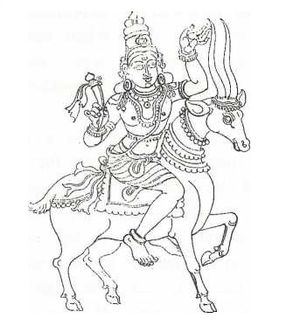Vāyu
From Hindupedia, the Hindu Encyclopedia
By Swami Harshananda
Significance of Vāyu[edit]
Vāyu or air is one of the pañcabhutas or five basic elements of the world. Vāyu is also the presiding deity over it and is said to be dikpālaka[1] ruling in the direction of north-west. Hanumān and Bhīma were born due to his grace. Vāyu as vital air acts inside the body as five major prāṇas and five subsidiary prāṇas.[2]
Iconographic Representation of Vāyu[edit]
Iconographical works describe him as white or ash-grey in complexion. He has two hands carrying a bow and an arrow. He rides on a deer. Some works describe him as having four arms holding a banner[3] with two and a water-pot in the third, the last hand showing varadamudrā.[4] Sometimes the four hands are shown as holding:
Vāyu’s palace is called Gandhavatī.
References[edit]
- The Concise Encyclopedia of Hinduism, Swami Harshananda, Ram Krishna Math, Bangalore

